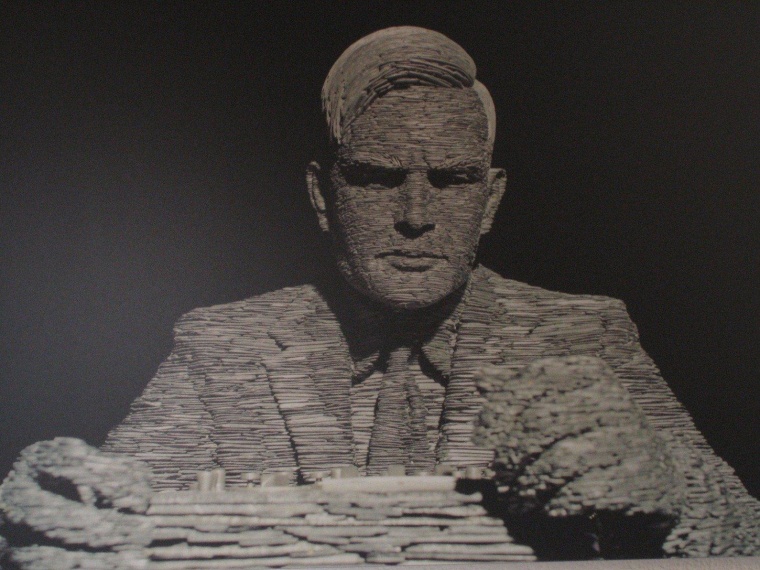The June 23 centennial of Alan Turing's birth is providing an opportunity to look back at the brilliant life and tragic end of a pioneer in computer science — a Briton who was instrumental in cracking Germany's Enigma code and turning the tide of World War II, but who killed himself after his humiliation by a society that saw homosexuality as a crime.
Turing came up with the concept of a "universal machine" back in 1936, setting the stage for the quest to create artificial intelligence. It's a quest that's as old as Ovid's Metamorphoses and as new as IBM's Watson. His vision of a computer so knowledgeable and adept in the ways of society that humans would think it was human, too, led to the establishment of the "Turing Test" as a classic gauge of machine intelligence. (Some argue that a program called Cleverbot passed the Turing Test last year.)
His greatest contribution came during the war, when he designed an electromechanical device known as the "bombe." With additional refinements, the cabinet-sized machine at Britain's Bletchley Park could decode thousands of intercepted German messages, tipping off the allies about the Nazis' next moves.
The intelligence gleaned by the Bletchley Park team, code-named Ultra, was crucial to the Allied war effort. "It was thanks to Ultra that we won the war," British Prime Minister Winston Churchill told King George VI.
Gay hero? Or just plain hero?
The postwar era, however, was a disaster for Turing, who was gay. He got into a messy relationship with a man who helped an accomplice break into Turing's house — and after Turing reported the burglary, the investigation of the break-in eventually turned into an investigation of the researcher's sexual behavior.
At that time, in 1952, homosexual behavior fell under a criminal category known as gross indecency, and Turing's conviction could have put him in prison. As an alternative, Turing chose chemical castration through hormone injections. His security clearance was revoked, and he was barred from working for the British government. Turing pressed for a change in Britain's laws, but homosexuality remained a criminal offense in Britain until 1967.
That was way too late for Turing. Two years after his conviction, he died in his laboratory after eating a poisoned apple.
In 2009, British Prime Minister Gordon Brown issued a posthumous apology to Turing, saying that the computer pioneer "truly was one of those individuals we can point to whose unique contribution helped to turn the tide of war."
"The debt of gratitude he is owed makes it all the more horrifying, therefore, that he was treated so inhumanely," Brown said. "We're sorry. You deserved so much better."
Today, Turing is hailed in some quarters as a tragic gay hero. But during this centennial year, the spotlight is squarely on science rather than sex. Google executive Vinton Cerf, who's considered one of the creators of the Internet, said in a BBC retrospective that he hoped this year's exhibits and observances would "help make Turing a hero and household name beyond the technical community that reveres his memory."
Texts on Turing
Cerf's tribute is one of seven essays on Turing'slife and legacy being posted to the BBC's website this week. Wired's British website is also presenting a rich variety of perspectives to celebrate Turing Week. This weekend, luminaries from around the world will gather at the University of Manchester for a Turing centenary conference. Video from the conference is due to be streamed live. It's all part of Alan Turing Year.
To read up on Turing and his times, you can start with Andrew Hodges' 1983 biography, "Alan Turing: The Enigma," which has been reissued in a centenary edition. (In addition to the book, Hodges maintains a biographical website at Turing.org.uk.) There's also a centenary edition of "Alan M. Turing," the biography written in 1959 by Sara Turing, Alan's mother. "The Man Who Knew Too Much" is a more recent biography of the great man, written by David Leavitt in 2006.
Charles Petzold's "The Annotated Turing" delves into Alan Turing's groundbreaking 1936 paper, while Princeton University Press is putting out "Alan Turing's Systems of Logic: The Princeton Thesis," a facsimile edition of Turing's Ph.D. thesis. There's also "The Essential Turing," a compilation of the researcher's best-known writings. And if you're looking for something fresh that puts Turing's achievements in a wider context, check out George Dyson's book, "Turing's Cathedral: The Origins of the Digital Universe."
Any birthday wishes you'd like to pass along for the centennial? Feel free to post them as comments below.
More about the history of computing:
- A brief history of computers
- British code crackers reunite, pride unbroken
- Museum celebrates 2,000 years of computing
- For tech pioneer IBM, 100 years of 'Think'
Alan Boyle is msnbc.com's science editor. Connect with the Cosmic Log community by "liking" the log's Facebook page, following @b0yle on Twitter and adding the Cosmic Log page to your Google+ presence. You can also check out "The Case for Pluto," my book about the controversial dwarf planet and the search for new worlds.
